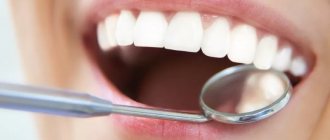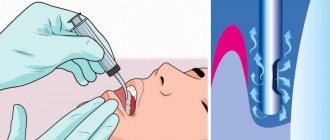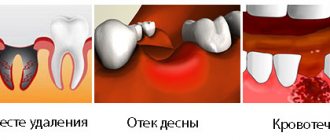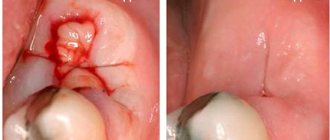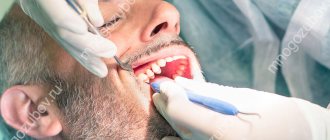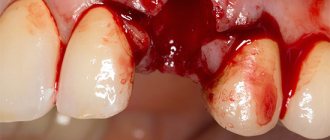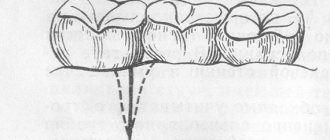Tooth extraction: swelling
Tooth extraction is a difficult operation that traumatizes the tissue surrounding the tooth. Therefore, it is not surprising that unpleasant consequences occur after tooth extraction: the most common of them is swelling. Patients often complain that after tooth extraction, the gums become swollen, swelling of the cheek or a slight gumboil appears. This is caused by partial destruction of the soft tissue around the tooth. This is unpleasant, but if the tumor is small, it goes away on its own in 2-3 days. To relieve swelling after tooth extraction, ice can be applied to the cheek for about 10 minutes. If the swelling has not gone away after a day, apply heat. Keep the heating pad for 20 minutes, then take a break for 10 minutes and put the heating pad back on.
Sometimes swelling can be caused by an allergy to the anesthesia. In this case, histamine, an antiallergic drug, will help. But if the swelling increases, then it may be a sign of inflammation that has arisen after tooth extraction. In this case, you should immediately consult a doctor.
How to distinguish the effects of anesthesia from numbness
Numbness of the jaw after removal (paresthesia) and loss of sensitivity due to a “freezing” injection given before surgery are completely different things. The anesthetic contained in the injection temporarily blocks the transmission of nerve impulses along the nerve trunk. Otherwise, removal will be very painful - and this is a lot of stress for the body. After an injection of anesthesia, the patient begins to understand that the cheek, gums, tongue, and part of the lip are gradually becoming numb. Some people notice that goosebumps “run” along the neck, near the nose, under the eye. The effect of the injection is maximally manifested after 10-30 minutes, and numbness may persist for another 1.5-5.5 hours. The duration of “freezing” depends on the concentration of the substance and the characteristics of the patient’s body.
How long does numbness last after tooth extraction? When the anesthesia wears off, sensitivity gradually returns to the tissues. This usually occurs several hours (on average 2 hours) after treatment or removal. But not always. Sometimes the numbness does not go away the next day, a week later, or even longer. Here it is not anesthesia that is “to blame”, but some features of the body’s recovery after the intervention or other reasons, which will be discussed below.
Pain after tooth extraction
Another common complaint is that after tooth extraction, the gums, adjacent tooth, jaw, and throat hurt. As a rule, these are common symptoms after a traumatic procedure. They are caused by damage to the periodontal tissues and nerves, which goes away on its own after a few days. For example, if a temporary aching pain appears after tooth extraction, this is normal. To relieve discomfort, you can take painkillers. But if the pain intensifies, it is still worth visiting a doctor.
Possible complications
The human factor plays a huge role in all dental procedures, including the administration of anesthetic.
Complications that may occur after local anesthesia:
- Unpleasant sensations in the injection area. Injecting the medicine too quickly or too slowly may cause pain.
- Hematoma at the site of needle insertion. The formation of a hematoma indicates problems with blood vessels or that the injection site was chosen incorrectly.
- Allergy. An allergic reaction to one or even several components of an anesthetic.
- Inflammatory process, development of infection. This is possible if errors were made during the administration of the anesthetic, due to which microbes penetrated the soft periodontal tissues and caused inflammation.
- Numbness of the facial muscles. The patient cannot control his facial expressions and cannot close his lips.
Bleeding after tooth extraction
Immediately after a tooth is removed, there is bleeding from the socket. This is quite normal, since blood vessels rupture during surgery. In this case, the doctor will provide you with the necessary assistance. But sometimes bleeding occurs a few hours after surgery. To stop the bleeding yourself after tooth extraction, apply a small gauze swab to the hole and lightly bite it. After 15 minutes the blood stops flowing. But if the bleeding does not stop for a long time, you should consult a doctor.
How long does the anesthesia wear off?
Dentists use special types of anesthesia:
- using applications (in this case, the anesthetic is applied to the area treated with antiseptic substances in the form of a gel, ointment, solution);
- due to the conductor, that is, through injections (carried out for a long-term type of dental intervention, Novocain is used);
- infiltration (three-stage type, indicated for complex manipulations).
After surgery to remove or treat, depending on the type of anesthesia, a feeling of numbness remains. If this is not due to disturbances in pain relief, then the numbness goes away after a certain period of time.
Experts have established a maximum threshold for each type of anesthesia and recommend closely monitoring how much time has passed since dental procedures were performed:
- numbness after application of anesthesia can last up to 30 minutes;
- after conduction – up to 5-6 hours;
- after infiltration – up to 3-4 hours.
The characteristics of the patient should be taken into account, such as age, weight, general health.
Pus after tooth extraction
Suppuration of the socket and periodontal tissues is caused by their infection. It can happen for several reasons. Firstly, if you did not follow the dentist's instructions regarding individual oral hygiene after surgery. Secondly, the cause may be a tooth fragment remaining in the tissues after removal. Thirdly, there is a high risk of suppuration after a complex wisdom tooth extraction, for example. If the inflammation is not treated in time, then some time after removal, suppuration, a fistula on the gum, and even a cyst may appear. If pus appears at the surgical site, consult a doctor. He will find and eliminate the cause of the inflammatory process.
Numbness after dental anesthesia: symptoms, causes
The problem with diagnosing complications of anesthesia is that numbness of the jaw is a natural condition after anesthesia. If accompanying symptoms are added to it, you should consult a doctor. Associated symptoms:
- numbness of the tongue, burning and tingling;
- numbness of the cheek;
- sagging part of the face;
- tooth pain;
- pulsation in the gums;
- profuse salivation.
There are only three factors influencing the symptom:
- a needle entering a blood vessel when injecting an anesthetic;
- nerve damage;
- exposure to the anesthetic due to its increased toxicity.
The needle gets into the vessel and may break off. The nerve is damaged when instruments are applied. The toxicity of the anesthetic increases with minimal errors by anesthesiologists.
Some people experience prolonged numbness of the tongue and lips after wisdom tooth removal. This procedure is difficult due to the awkward position of the third molar in the mouth. When performing manipulations, there is always a risk of damage to the mandibular nerve, which is located close to the root. Wisdom teeth often have slopes because they appear later than others and do not have enough space for proper growth. In this position, it can be extremely difficult to grab it with tools. Paresthesia after wisdom tooth removal will spread to the tongue or part of it; the lips and gum areas above the problem area are at risk.
It is also important to remember about possible damage to the facial nerve, in the trunk of which there are sensory and secretory fibers; they are responsible for facial expressions and motor activity. If one of the fibers is damaged, numbness occurs in the lower part of the face.
Numbness may be due to a nerve being hit during surgery. Nerve damage during tooth extraction is common. This is due to the location of the tooth; with deep internal growth, sawing the bone and using forceps is required. When applying the instrument, the dentist closes the viewing angle and acts almost intuitively. In this case, nerve damage occurs, especially when removing wisdom teeth that are close to the nerves.
Dry socket after tooth extraction
A blood clot should remain in the socket after surgery. This is a very important part of the healing process. This clot protects the bone and nerve endings and serves to form bone tissue after tooth extraction. Therefore, you should not rinse your mouth for a day after the procedure and eat hot food - this will help the clot dissolve. But sometimes it does not form, and a dry socket appears.
Dry socket is considered a complication. It most often occurs after complex removals accompanied by significant trauma. If there is no blood clot, then the hole after tooth extraction hurts, and sometimes it seems that the ear also hurts. Often there is an unpleasant taste in the mouth. The consequence of a dry socket after a traumatic tooth extraction can be inflammation of the gums or alveolitis. Therefore, if you experience acute pain in the socket, consult a doctor immediately. He will place a tampon with a special anti-inflammatory gel on the hole. Tampons are changed until healing begins.
Alveolitis after tooth extraction
This is a serious complication caused by tooth extraction, which has several causes. This may be the presence of chronic inflammation of the tissues around the tooth - periodontitis, or a dry socket. In addition, alveolitis occurs if, after tooth extraction, a dental fragment remains in the tissues. All these factors cause infection of the hole and the development of its inflammation. 1–3 days after tooth extraction, pain occurs, followed by a specific smell from the mouth. Then these symptoms intensify, the hole becomes covered with a gray coating, and it becomes impossible to eat due to severe pain.
In this case, only a doctor will help you, who will carry out the necessary treatment and clean the hole from infection. Do not self-medicate under any circumstances - alveolitis can develop into periostitis (inflammation of the periosteum), causing an abscess and phlegmon.
Painful sensations after the removal procedure are unpleasant, but inevitable. Remember, if these sensations intensify, then in this case, complications after tooth extraction should be treated by a specialist. Do not delay visiting the dental clinic, dulling the pain with analgesics. Correct and timely treatment will help you avoid more serious complications.
Nerve damage during wisdom tooth extraction
29.10.2020
Probably, nature once wanted a person to be very wise and endowed him with a generous gift - eighth teeth, which now, unfortunately, cause considerable problems. The roots of “eights” are often curved; it is sometimes impossible to fully care for the dental units due to their inconvenient location, which entails the development of caries. In some cases, wisdom teeth bother their owner even at the initial stage of eruption. Considering that the eighth dental units do not bear a functional and aesthetic load, in certain situations a decision is made to remove them.
Possible pain after wisdom tooth removal
- Jaw pain. It can occur due to rupture of ligaments and blood vessels, as well as nerve endings, or the doctor applied light pressure on the jaw to gain access to a distant dental unit.
- Pain when swallowing. They appear after the “figure eight” on the lower jaw has been removed. This happens because a nerve was hit when a wisdom tooth was removed.
Basically, it is problematic to remove a dystopic or impacted tooth; it is located in the bone tissue and has not yet fully erupted. In this case, the bone is sawed and special forceps are used. There is a risk that damage to the trigeminal nerve will occur when wisdom teeth are removed. Persistent pain after removal of a tooth indicates pathology. If the body temperature rises, swelling and bruising appear, and you feel unwell, this indicates the presence of an inflammatory process.
Unbearable toothache usually occurs when the second and third “branches” of the trigeminal nerve become inflamed. Intense pain is localized in the ears, chin, even in the lower lip. Periodically, the acute pain dulls, but the person continues to experience discomfort. The reason is that a nerve was probably hit during the removal of a wisdom tooth, or unsuccessful dental procedures were performed: filling, surgical manipulations. In such a situation, you need to contact your dentist. The doctor will give appropriate recommendations on how to restore the nerve after tooth extraction. Typically, the patient is prescribed B vitamins, as well as drugs that stimulate blood circulation and reduce blood viscosity. Properly carried out therapy can achieve positive results and restore the nerve.
Causes of paresthesia
The “eight” has been successfully treated or removed, the patient returned from the dentist in perfect order, but suddenly a strange feeling of numbness appears on the cheeks, tongue, and lips. The effect of the anesthetic has passed, but the unpleasant symptoms continue: the face becomes as if plastic, tingling, burning, and sometimes pain are felt. These signs indicate the presence of paresthesia.
- Incorrect position of the figure eight, its curved roots or very close dislocation of the processes of the trigeminal nerve - these factors cause damage to the nerve during wisdom tooth removal.
- The wound is swollen and there is heavy bleeding, oxygen does not properly reach the nerve endings, and as a result, numbness occurs.
- When injecting into a diseased tooth, it is possible that the needle may enter the alveolar nerve. In this situation, the sensitivity of the tongue, chin and lips is not lost much; it only takes a few days to recover.
Symptoms of paresthesia can last a couple of days or several months, rarely more than a year. Numbness that does not go away over a long period of time is called chronic paresthesia. If this diagnosis is protracted, the patient is prescribed treatment:
- Drugs are prescribed to reduce blood viscosity and establish normal blood circulation, injections intramuscularly, intravenously.
- Physiotherapeutic procedures are carried out: UHF, mud treatment, electrophoresis, diadynamic currents, magnetic therapy.
- In the absence of positive results, they resort to surgical treatment, but such cases are rare.
If during therapy the patient continues to complain of a lack of sensitivity, he is additionally examined by a neurophysiologist and the type of neuropathy is determined based on electroneuromyography.
Professional surgeons – dentists, as a rule, are specialists in their field. They have excellent knowledge of anatomy, have an excellent understanding of the complex structure of the lower jaw canal, plus vast practical experience. Therefore, if wisdom tooth removal is prescribed according to indications, you should not delay it. Experienced, attentive dentists will definitely conduct a preliminary consultation with the patient before removal in order to dispel all his fears and doubts and prevent serious mistakes during treatment.
Back



